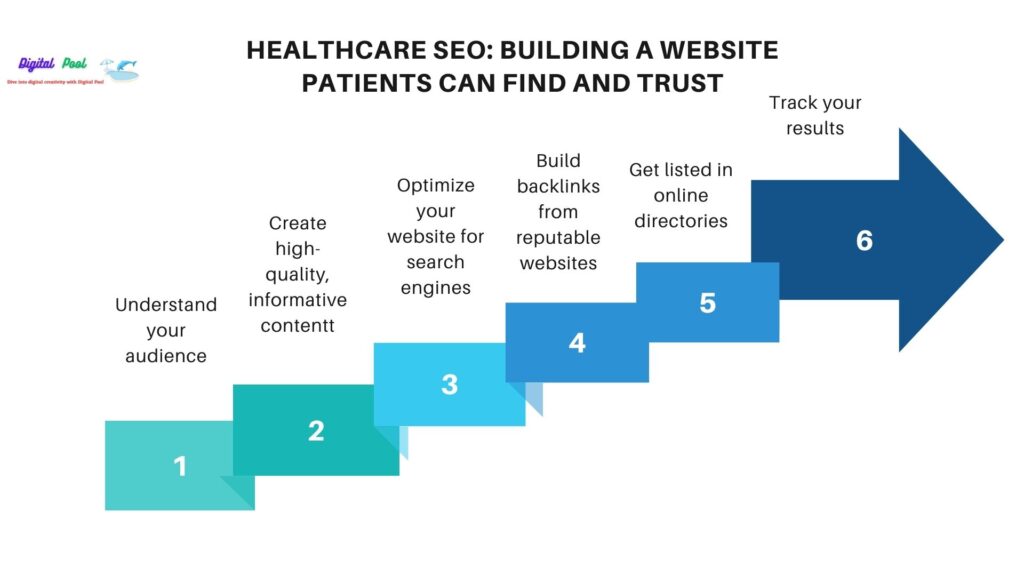In the digital age, a well-optimized website is essential for any business, but for healthcare providers, it is a lifeline. Patients rely on the internet to research conditions, find doctors, and schedule appointments. That is where Healthcare SEO comes in. It is the art and science of making your website visible and trustworthy to potential patients searching online.
But where do you start? Here are the main things to keep in mind when doing Healthcare SEO:

1. Understand your audience
Imagine you are setting up a shop, but instead of selling toys, you are offering healthcare information and maybe even connecting people with doctors. To make sure the right folks find your shop, you have to know who’s walking by and what they’re looking for. That is what healthcare SEO is about.
First, picture your customers, who are they worried about when it comes to health? Maybe it’s back pain, managing diabetes, or finding a therapist. By understanding their concerns, you can stock your shop (your website) with the answers they need. Write articles about managing back pain, tips for living with diabetes, or how to choose a therapist.
Next, think about how they’d search for your shop. Imagine them asking a friend, “Hey, where can I find info on back pain?” That friend might say, “Try searching ‘back pain stretches’ or ‘best back pain exercises’ online.” These are the keywords. Sprinkle them throughout your website and articles, so when someone asks Google those same questions, your shop pops right up.
So, by knowing your customers’ worries and their search words, you can fill your healthcare SEO shop with helpful content and guide them right to the answers they need. Remember, a happy, informed customer is a loyal customer, and that is what healthcare SEO is all about!
2. Create high-quality, informative content
People searching for health information online want the real deal. Information should be trustworthy, and answers should be to their questions and worries should be practical. This is where your healthcare website comes in. Think of it as a helpful friend, brimming with blog posts, articles, and pages that guide them through health concerns and offer practical advice.
But remember, your visitors are not doctors themselves. Ditch the confusing medical jargon and speak their language. Clear, simple words are key to building trust and understanding. Imagine explaining something to a friend or family member “That is the tone you want”
By filling your website with top-notch, easy-to-read content, you are doing double duty for your healthcare SEO. Search engines see your website as a valuable resource, pushing it higher in the results, which means more people find your helpful advice. It is a win-win. So, go ahead, write those informative blog posts, create those clear-as-day articles, and watch your website become the trusted friend everyone turns to for healthcare answers.
3. Optimize your website for search engines
Figure out what words folks typically use when looking for healthcare online. These are your keywords, like “back pain treatment” or “allergy doctor near me.” Sprinkle these words throughout your website, like on the title page, the little blurb under the title (called the meta description), and headings on different pages. Don’t forget to use them naturally in the text too.
Make sure your website is easy to use on any phone or tablet. Think of it like building a wide, clear path for everyone to find what they need, no matter what device they are using. Big buttons, simple menus, and short paragraphs all help people get the information they need quickly and easily.
By using clear keywords and making your website mobile-friendly, you are giving search engines and potential patients a helpful map to find you. It is like putting up a big, friendly sign that says “Come on in, we’re here to help!” And that is the magic of healthcare SEO.
4. Build backlinks from reputable websites
If you just wrote an awesome article about healthy recipes. You want everyone to find it and try your delicious, good-for-you dishes! High-quality backlinks are like friends telling their friends about your article. When a respected website, like a famous chef’s page, mentions your recipes, it is like they’re giving you a thumbs-up and saying, “Hey, this stuff is great!” Search engines listen to these recommendations, just like you trust your friends’ advice. When lots of trustworthy websites link to your article, the search engine thinks, “Wow, everyone loves this! It must be super tasty and healthy!” This puts your article at the top of the search results, so even more people discover your yummy creations. So, backlinks are like votes of confidence from online friends, helping your healthy recipes reach a bigger audience!
In the world of healthcare, backlinks work the same way. Imagine you wrote a clear explanation of diabetes management on your clinic’s website. When a well-known medical organization links to your article, it is like they’re saying, “This information is accurate and helpful for patients!” This boosts your website’s reputation and makes it easier for people searching for diabetes help to find your trusted advice. So, backlinks are like votes of confidence from respected healthcare voices, helping you reach more people in need of your expertise.
Remember, just like you would not want all your friends recommending a bland recipe, not all backlinks are equal. The best ones come from websites relevant to your topic and with a good reputation. So, focus on creating valuable content and earning links from trustworthy sources, and your healthcare information will reach the people who need it most.
5. Get listed in online directories
If patients are looking for a new doctor or dentist. They open their phone and start searching. Wouldn’t it be great if your practice popped right up at the top of the results?
Think of the internet like a giant phone book, but much easier to use! There are special websites called “directories” where people can look for all sorts of things, like doctors and dentists. You want to make sure your practice is listed on the most popular ones, like Google My Business, Healthgrades, and Yelp.
It is like putting your office address and phone number in those old-fashioned paper phone books, but way better! When people search for the kind of care you offer in your area, your practice will show up, making it easy for them to find your website and even give you a call.
So, why wait? Adding your practice to these online directories is quick and free. You can hire an SEO freelancer or consultant for this job too. It is a simple way to help new patients discover you and get the care they need.
6. Track your results and adjust your strategy
Imagine SEO like gardening. You plant the seeds with keywords and good content, but just like any garden, it needs constant care to grow. This is where “analytics tools” come in. They are like little helpers who tell you how your SEO garden is doing.
These tools can analyse how many people visit your website (traffic), where they came from, and what words they used to find you (keyword rankings). These tools also point out things that are not doing well.
With this information, you can adjust your plan. Maybe add some new keywords in those empty spaces, or give some pages a bit more sunshine with fresh content. Remember, a good SEO takes time and attention, but with these tools and a little effort, you will see beautiful results over time!
